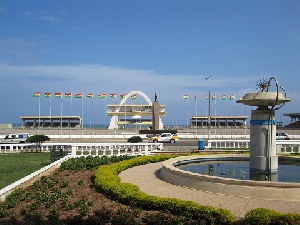Head of Quantum Global Research Lab, Prof Mthuli Ncube, has said Ghana was on the right track to improve it economic rankings on the continent.
He said, there was no doubt on the fact that, the country in the near future, would do even better than it current position as the 18th most attractive investment destination by Quantum Global Research Lab.
“We have no doubt this current government is doing the right things that will move Ghana up the ranking and improve investment climate going forward”.
The professor said, if the Akufo-Addo government, is able to improve higher growth level of 5 percent or 6 percent, infrastructure investment is going to be key as promised, then it will only get better going forward.
“Government has made it very clear that it want to investment in infrastructure in very innovative ways, in ways that it will not push up the government debt”, he noted.
Prof. Ncube, said this on the sidelines of the release of the latest Africa Investment Index (AII) by Quantum Global’s independent research arm, Quantum Global Research Lab on Tuesday in Accra.
In 2016, Ghana attracted a net foreign direct investment of US$3.5 billion.
According to research by Quantum Global Research Lab (QGRL), Ghana’s economy, has experienced strong and robust growth over the past decade, making its success a case worth emulating by its regional peers.
Prof Ncube said, “Ghana’s democratic attributes are as robust as its economic growth, and by improving policies and institutions, successive governments have been able to build an attractive business climate conducive to growth.
These measures include; reducing the number of days it takes to register a limited liability company and days spent on resolving commercial disputes in the courts.
Furthermore, the election of a new Government in 2016, has revitalized the drive for higher growth and infrastructure investment, all which augurs well for investment opportunities in the country.”
The research noted that, whilst the economy continued to grow on a steady pace until 2013, the Gross Domestic Product (GDP) growth slowed from 7 percent in 2013 to 3.6 percent in 2016, due to structural challenges such as the on-going fiscal deficits pushing public debt to over 70 percent of GDP, trapping the country in a cycle of debt service and borrowing.
Furthermore, a 3-year power crisis and power rationing slowed down private sector’s productivity and competitiveness.
In addition, the significant external sector deficit and low world prices for the country’s gold, cocoa and oil export were a major factor behind the economic slowdown.
According to the research, the financial sector in Ghana, has undergone restructuring and transformation, and the supervisory framework is relatively strong. Bank credit to the private sector has increased, and capital markets are developing.
The sector was rated as fairly developed by the 2014-2015 Global Competitiveness, with Ghana ranking 67th from 116th out of 148 countries.
According to the AII report, the top five African investment destinations attracted an overall FDI of $13.6bn. Botswana was ranked the most attractive economy for investments flowing into the African continent followed by Morocco, Egypt, South Africa and Zambia.
An Economic Adviser to the Vice President, Dr. Gideon Boako said, although he would have wished to see Ghana performing better than placing 18th, he was hopeful that considering what the new government is putting in place, the ranking will be better in 2018.
“Am not happy with the current rankings of Ghana even though we ranked 18th if it had been in the whole world, I would have been happy but 18th in Africa, we have been touting ourselves as the Black Star of Africa, Gateway to Africa and so, one would have expected that in African rankings, would have come far.
There is higher optimism that Ghana is going to rank higher in next year’s rankings so that is the solace we take.
We take solace and comfort in this that people outside of the country using all their money just to monitor Ghana, have seen some good prospect in the country based on what the current administration is doing so we are all looking forward to it”, Dr. Boako said.
Construction of the Index The AII is constructed from macroeconomic and financial indicators and the World Bank Group’s Ease of Doing Business Indicators (DBI). The DBI ranks countries in terms of a regulatory environment conducive to business operation.
The AII focuses on 6 pillars or factors from a wider range of investment indicators, which include the share of domestic investment in GDP, the share of Africa’s total FDI net inflow, GDP growth rate forecast, population augmented GDP growth factor, real interest rate, the difference of broad money growth to the GDP growth rates, inflation differential, credit rating, import cover, the share of the country’s external debt in its GNI, current account ratio, ease of doing business and the country’s population.
The AII is a combination of individual indicator’s rank into a single numerical ranking. It averages the country’s macroeconomic and financial indicators rankings on the six different factors.
Each indicator, and hence factors, receives an equal weight. Their rank score is then averaged to produce the total average score which is consequently ranked from 1 to 54. The lower the value of the ranking, the better the implied business investment climate.
To produce an index score that captures medium-term changing aspects, individual country’s ranking is scaled relative to a benchmark or reference value (i.e., the past 3-year rolling average ranking).
In addition to the intended measurement, this approach enables us to avoid periods of structural changes (which may compromise the index) that may be present in a longer time span, whether we consider a change from a reference average value or a historical reference period.
Business News of Friday, 21 July 2017
Source: theheraldghana.com













